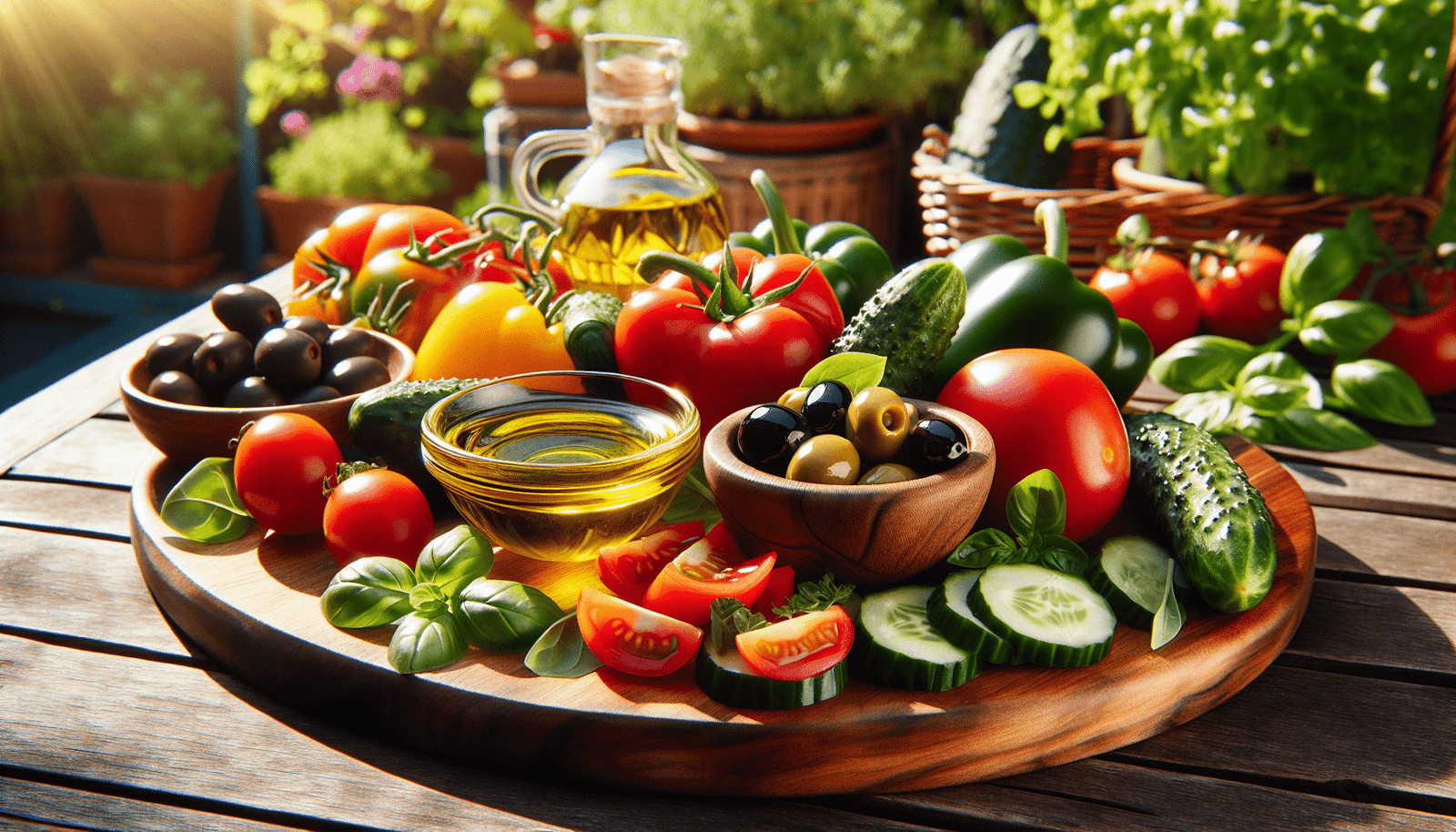Have you ever wondered what makes the Mediterranean diet so popular?
The Mediterranean diet isn’t just a diet; it’s a lifestyle steeped in tradition, culture, and, most importantly, delicious foods. Known for its health benefits, this eating pattern emphasizes wholesome, fresh ingredients. Let’s take a closer look at what foods you can enjoy on this delightful diet.
What is the Mediterranean Diet?
At its core, the Mediterranean diet focuses on fruits, vegetables, whole grains, lean proteins, and healthy fats. Originating from the countries bordering the Mediterranean Sea, it promotes a balanced and varied diet that nurtures both the body and mind. Unlike many other diets that restrict certain food groups, this diet encourages you to eat a wide range of foods, making it easier to sustain and enjoy.
Key Components of the Mediterranean Diet
The Mediterranean diet can be broken down into several key components that highlight the types of foods you should aim to include in your meals:
- Fruits and Vegetables: A rich assortment of produce is essential in this diet. Aim for a colorful variety to get the most nutrients.
- Whole Grains: Whole grains provide essential fiber, which is vital for digestion and overall health.
- Healthy Fats: Unlike unhealthy fats, the Mediterranean diet encourages the consumption of healthy fats, primarily from olive oil and nuts.
- Lean Proteins: This includes fish and poultry rather than red meat, while plant-based proteins are also highly encouraged.
- Dairy in Moderation: While dairy is part of the diet, it is usually consumed in moderation, often in the form of yogurt or cheese.
- Herbs and Spices: Flavoring your meals with herbs and spices instead of salt enhances taste and adds health benefits.
Fruits and Vegetables
One of the cornerstones of the Mediterranean diet is an abundance of fruits and vegetables. They provide a wealth of nutrients, antioxidants, and fiber, making them crucial for your overall health.
Variety of Fruits
When it comes to fruits, think beyond the typical apple and banana. Mediterranean diets are rich in citrus fruits, berries, stone fruits, and tropical varieties. Some excellent fruits to incorporate into your diet include:
| Fruit | Nutritional Benefits |
|---|---|
| Oranges | High in vitamin C and antioxidants |
| Grapes | Source of resveratrol, beneficial for heart health |
| Figs | Excellent source of fiber and calcium |
| Pomegranates | Packed with antioxidants and anti-inflammatory properties |
| Berries | Rich in antioxidants, good for brain health |
Abundant Vegetables
Similar to fruits, you should aim for a rainbow of vegetables. This variety not only enhances flavor but also ensures you get a diverse range of nutrients. Some staples include:
| Vegetable | Nutritional Benefits |
|---|---|
| Spinach | Rich in iron, vitamins A and C |
| Tomatoes | High in lycopene, good for heart and skin health |
| Bell Peppers | Excellent source of vitamins A and C |
| Zucchini | Low in calories and high in vitamins |
| Broccoli | High in fiber and a great source of potassium |

Whole Grains
Switching to whole grains is beneficial for your heart and digestive system. They are rich in fiber, which helps you feel full longer and aids digestion.
Types of Whole Grains
You have many options for incorporating whole grains into your meals. Some popular options include:
| Whole Grain | Nutritional Benefits |
|---|---|
| Quinoa | Complete protein source, contains all essential amino acids |
| Brown Rice | Rich in manganese and provides energy |
| Whole Wheat Pasta | Complex carbohydrates that sustain energy levels |
| Barley | High in fiber and aids in cholesterol reduction |
| Farro | Contains protein, fiber, and several vitamins |
Healthy Fats
The Mediterranean diet emphasizes healthy fats, primarily from plant sources. These fats are essential for maintaining heart health, lowering cholesterol, and providing satiation.
Sources of Healthy Fats
Incorporating healthy fats into your meals can be delicious and heart-healthy. Here are some excellent sources:
| Food | Nutritional Benefits |
|---|---|
| Olive Oil | Rich in monounsaturated fats, antioxidants |
| Avocados | High in healthy fats and excellent for heart health |
| Nuts (Almonds, Walnuts) | Great source of protein, fiber, and healthy fats |
| Seeds (Chia, Flax) | Packed with omega-3 fatty acids to support brain health |

Lean Proteins
Unlike diets that encourage excessive meat consumption, the Mediterranean approach favors lean proteins, particularly seafood and poultry.
Types of Lean Proteins
Incorporating these proteins into your diet can help maintain muscle mass while keeping your caloric intake in check:
| Protein Source | Nutritional Benefits |
|---|---|
| Fish | High in omega-3 fatty acids, helpful for cardiovascular health |
| Chicken | Lean source of protein, low in saturated fat |
| Legumes (Lentils, Chickpeas) | Excellent plant-based protein and fiber |
| Eggs | Packed with protein, vitamins D and B12 |
Dairy in Moderation
While cheese and yogurt play a role in the Mediterranean diet, moderation is key. These foods can provide beneficial calcium and probiotics.
Recommended Dairy Products
When including dairy in your diet, aim for lower-fat options. Here are some common choices:
| Dairy Product | Nutritional Benefits |
|---|---|
| Greek Yogurt | High in protein and contains probiotics |
| Feta Cheese | Lower in fat, adds flavor and contains calcium |
| Parmesan Cheese | Contains calcium and can be used sparingly as a flavor enhancer |

Herbs and Spices
Instead of relying on salt for flavor, the Mediterranean diet encourages the use of fresh herbs and spices. These not only enhance flavor but also provide health benefits.
Popular Herbs and Spices
Consider adding a variety of herbs and spices to elevate your meals:
| Herb/Spice | Nutritional Benefits |
|---|---|
| Basil | Anti-inflammatory properties, rich in antioxidants |
| Oregano | Good for digestion, high in antioxidants |
| Garlic | Supports immune function, can lower blood pressure |
| Rosemary | Rich in antioxidants, supports memory function |
Benefits of the Mediterranean Diet
Now that you have a clearer picture of what foods are included in the Mediterranean diet, let’s explore some of the benefits you might experience:
Heart Health
The Mediterranean diet is renowned for its positive effects on cardiovascular health. By emphasizing healthy fats, lean proteins, and fresh produce, you’re supporting your heart’s well-being and reducing the risk of heart disease and strokes.
Weight Management
The Mediterranean diet’s focus on whole, unprocessed foods can aid in weight management. You’ll feel fuller for longer, thanks to the fiber from fruits and vegetables, and the protein from lean meats and legumes helps prevent cravings.
Improved Digestion
The high fiber content found in whole grains, fruits, and vegetables promotes healthy digestion. Your gut will thank you!
Brain Health
With an abundance of nutrient-rich foods, the Mediterranean diet supports cognitive function. Omega-3 fatty acids, antioxidants, and healthy fats can help protect your brain health as you age.

Possible Challenges
While the Mediterranean diet offers numerous benefits, it may present some challenges. Here are a few common ones:
Variety and Meal Planning
Sometimes, the wide variety of foods can make meal planning a bit daunting. However, planning and preparing meals in advance can help alleviate this feeling. Set aside a day each week to prep your fruits, vegetables, and grains for easier access.
Availability of Ingredients
Depending on where you live, some Mediterranean staples may not be easily accessible. If you can’t find specific ingredients, look for local alternatives that provide similar benefits.
Portion Control
Though the Mediterranean diet encourages wholesome foods, portion control is still important to avoid overindulgence. Being mindful of your portions can maintain balance and prevent excessive calorie intake.
Incorporating the Mediterranean Diet into Your Life
Making the switch to a Mediterranean diet is easier than you might think. Here are some tips to help you get started:
Start Small
Begin by swapping out processed foods for whole foods. Aim to incorporate a few Mediterranean staples into your meals each week, such as adding more fruits and vegetables or substituting olive oil for butter.
Experiment with Recipes
Experimenting with Mediterranean recipes can keep your meals exciting. Search for simple recipes that incorporate ingredients from the diet, like a Greek salad, fish with herbs, or whole grain pasta dishes.
Engage in Social Eating
Food is a social experience in Mediterranean cultures. Consider hosting meals with friends or family where you can share delicious Mediterranean-inspired dishes.
Stay Active
Physical activity is an integral part of the Mediterranean lifestyle. Try to incorporate regular exercise into your routine, such as walking, cycling, or even dancing!

Summary
The Mediterranean diet is more than just a way of eating; it’s a lifestyle filled with vibrant flavors and nourishing foods. By focusing on fruits, vegetables, whole grains, lean proteins, healthy fats, and dairy in moderation, you can support your health while enjoying delicious meals.
As you embark on this journey, remember to listen to your body and enjoy the social aspect of mealtime. Soon, you may find that this enriching diet becomes a cherished part of your daily routine. So go ahead and embrace the Mediterranean way of life!


